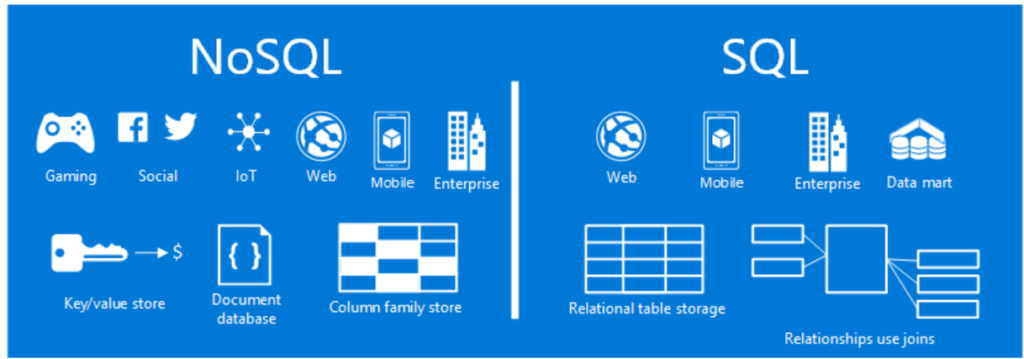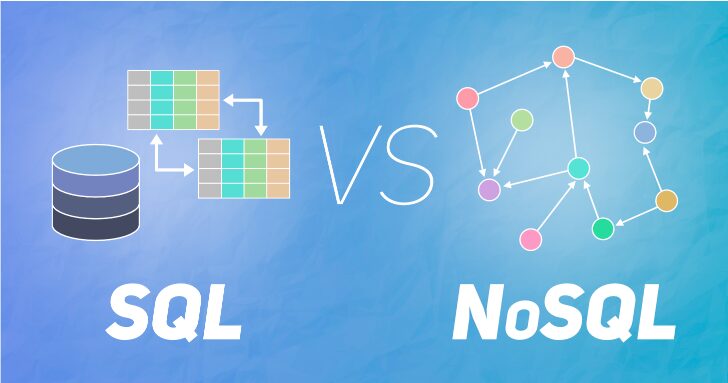In the database management, choosing SQL vs NoSQL databases is a pivotal decision that can significantly impact the performance, scalability, and flexibility of your application. Both SQL (Structured Query Language) and NoSQL (Not Only SQL) databases have their own strengths and weaknesses, making them suitable for different types of applications and use cases. This article delves into the effective use of SQL and NoSQL databases, providing insights into their core differences, advantages, disadvantages, and practical scenarios where each excels.
Understanding the advantages and appropriate use cases of SQL vs NoSQL databases enables Enozom to select the right technology for each project, ensuring optimal performance, scalability, and maintainability. This balanced approach to database management reflects Enozom’s commitment to delivering high-quality, customized software solutions that drive business success.
Understanding SQL Databases
SQL databases, also known as relational databases, have been the cornerstone of data management for decades. They are characterized by their structured schema, which enforces data integrity and consistency through relationships between tables.
Key Features of SQL Databases
- Structured Schema: SQL databases use predefined schemas, meaning the structure of data (tables, columns, data types) must be defined before data can be inserted.
- ACID Compliance: They ensure ACID (Atomicity, Consistency, Isolation, Durability) properties, which are crucial for applications requiring reliable transactions.
- Relational Model: Data is stored in tables with rows and columns, and relationships between tables are established using foreign keys.
- SQL Language: SQL databases use SQL for querying and managing data. SQL is a powerful language with robust features for data manipulation and retrieval.
Advantages of SQL Databases
- Data Integrity and Consistency: The structured schema and ACID compliance ensure high levels of data integrity and consistency, making SQL databases ideal for financial and transactional applications.
- Complex Queries: SQL provides powerful querying capabilities, allowing for complex joins, aggregations, and data transformations.
- Standardization: SQL is a standardized language supported by many database systems (e.g., MySQL, PostgreSQL, Oracle, SQL Server), providing interoperability and a large talent pool.
Disadvantages of SQL Databases
- Scalability Challenges: SQL databases can struggle with horizontal scaling (scaling out across multiple servers), often requiring complex sharding strategies.
- Rigid Schema: The predefined schema can be inflexible, making it difficult to handle evolving data models or unstructured data.

Understanding NoSQL Databases
NoSQL databases emerged to address the limitations of traditional SQL databases, particularly in the context of large-scale, distributed, and unstructured data applications. They offer a more flexible approach to data modeling and scalability.
Key Features of NoSQL Databases
- Schema-less Design: NoSQL databases do not require a predefined schema, allowing for more flexible and dynamic data models.
- Scalability: They are designed to scale horizontally, making them well-suited for large-scale, distributed systems.
- Variety of Data Models: NoSQL databases come in various types, including document stores (e.g., MongoDB), key-value stores (e.g., Redis), column-family stores (e.g., Cassandra), and graph databases (e.g., Neo4j).
- Eventual Consistency: Many NoSQL databases prioritize availability and partition tolerance over immediate consistency, providing eventual consistency in distributed environments.
Advantages of NoSQL Databases
- Flexibility: The schema-less design allows for the storage of diverse data types, making NoSQL databases ideal for unstructured and semi-structured data.
- Horizontal Scalability: NoSQL databases can easily scale out by adding more servers, accommodating large volumes of data and high traffic loads.
- Performance: They can offer high performance for specific use cases, such as real-time analytics, caching, and session management.
Disadvantages of NoSQL Databases
- Complex Queries: NoSQL databases often lack the advanced querying capabilities of SQL, making complex data retrieval more challenging.
- Consistency Trade-offs: The emphasis on availability and partition tolerance can lead to eventual consistency, which may not be suitable for all applications.
- Maturity and Standardization: The NoSQL ecosystem is less mature and standardized compared to SQL, leading to potential compatibility and interoperability issues.
Practical Use Cases
When to Use SQL Databases
- Transactional Systems: Applications requiring reliable transactions and data consistency, such as banking, e-commerce, and order management systems.
- Complex Queries and Reporting: Systems that need to perform complex queries, joins, and data aggregations, such as business intelligence and reporting tools.
- Structured Data: Use cases where the data model is well-defined and unlikely to change frequently.
When to Use NoSQL Databases
- Big Data and Real-Time Analytics: Applications that need to handle large volumes of data with low latency, such as log analysis, social media analytics, and IoT.
- Content Management and Personalization: Systems that require flexible and dynamic data models, such as content management systems and personalized recommendation engines.
- Distributed and Scalable Systems: Applications that need to scale horizontally across multiple servers, such as large-scale web applications, gaming, and cloud-based services.

Conclusion
Choosing SQL vs NoSQL databases depends on the specific requirements of your application, including data structure, consistency needs, scalability, and performance. SQL databases excel in scenarios requiring structured data, complex queries, and strong consistency, while NoSQL databases offer flexibility, horizontal scalability, and performance for unstructured and large-scale data. Understanding the strengths and limitations of each can help you make informed decisions and leverage the right database technology for your needs.
